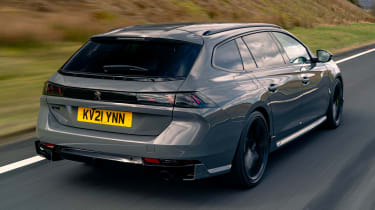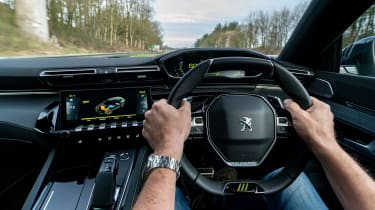Peugeot 508 SW Peugeot Sport Engineered review
Practical, efficient and fast, the 508 SW Peugeot Sport Engineered is an unlikely but worthy rival to the more established sporty saloon and estate offerings from German brands
Pros
- Refined in Comfort mode
- Fast and agile in Sport mode
- Practical, especially in estate form
Cons
- Poor infotainment
- Average interior quality
- Doesn't sound fantastic
| Car type | Electric range | Fuel economy | CO2 emissions |
|---|---|---|---|
| Plug-in hybrid | 26 miles | 139mpg | 46g/km |
Sports saloons and estates are beloved of practical-minded enthusiasts and the segments have traditionally been dominated by German brands like Audi, BMW and Mercedes. But Peugeot now has them in its crosshairs with the 508 Peugeot Sport Engineered (PSE), bringing a healthy dose of plug-in hybrid (PHEV) trickery and a choice of 'fastback' (hatchback) or 'SW' (estate) bodies to complete the package.
Peugeot hasn’t shied away from stating its flagship performance car targets the likes of the Audi S4 and BMW M340i, while also going up against plug-in hybrids like the Volkswagen Passat GTE, BMW 330e and Volvo V60 Recharge. It’s not crazy to do so either, as the 508 PSE boasts a healthy 355bhp and 520Nm of torque – not to mention a near-£56,000 price tag in SW estate form, as tested here. These figures aren't dissimilar to rivals' and show how serious Peugeot is about its new aspirational image.
Again though, Peugeot being Peugeot, it has done things differently. In place of a conventional turbocharged straight-six like in its German rivals, the PSE uses a familiar 1.6-litre PureTech turbocharged four-cylinder petrol engine in conjunction with a pair of electric motors (one on the front axle and one on the rear) powered by an 11.5kWh battery.
That battery should take an hour and 45 minutes to charge from a 7.4kW home wallbox, while using a three-pin plug will top it up from empty to full in seven hours. Not only does that give you a fully electric driving range of 26 miles, but with 355bhp, this is the most powerful Peugeot production road car ever. An eight-speed automatic gearbox handles the engine and front motor’s power, and in Sport mode you’ll feel the full force of the electric motors as you’re propelled from 0-62mph in 5.2 seconds.
But the experience of driving a sports saloon or estate is about more than just strong acceleration, and the PSE unfortunately lacks the exciting soundtrack you get from a thirsty, purely petrol-powered powertrain. The plug-in hybrid setup does help when you're just cruising on the motorway, as the electric motors keep things quiet, boosting the car's already strong refinement.
Although it certainly isn’t the same experience you get from a regular 508 Hybrid. The differences between the PSE and Peugeot’s standard family saloon and estate begin with the carbon-fibre exterior and 'Kryptonite' green accents. Adjustable suspension is standard, the front and rear track has been widened and the springs are 50% stiffer than those on a regular 508 Hybrid. The 20-inch alloy wheels are wrapped in grippy Michelin Pilot Sport 4S tyres and there are special high-performance brakes on the front wheels.
In Comfort mode, the ride is still on the firm side, but that's acceptable when you remember this car’s sporting intentions, and it cruises smoothly enough at motorway speeds. And you appreciate that firm edge once you're off the motorway, as the PSE has little body lean when cornering, which is excellent for an estate car that weighs 1,875kg (the saloon is 1,850kg). There's also a pleasing level of involvement in the PSE’s steering; it responds quickly through the small-diameter wheel.
Being a plug-in hybrid also creates some additional benefits beyond performance. Peugeot claims the PSE is capable of very nearly 139mpg and CO2 emissions as low as 46g/km, resulting in a Benefit-in-Kind company-car tax rate of just 13% in the current financial year. This is in stark contrast to its purely petrol and diesel-powered rivals' rates of up to 37%. Plus, for a sporty car, the SW we tested is extremely practical, with 530 litres of boot space and a relatively generous amount of legroom all around.
However, while the leather and Alcantara seats are nice, finding the ideal driving position can be tricky with Peugeot’s i-Cockpit setup, where the intention is that you look over the top of the wheel at the car's digital dials. And that technology is one area the Peugeot falters compared to its German rivals, as although the bespoke graphics on the 12.3-inch touchscreen and 10-inch central display are great to look at, the system is laggy with less resolution than other systems.
Similarly, the Peugeot doesn’t hold up inside compared to the more luxurious interiors of Audis and BMWs at this price point. Too frequently there are hard plastics where we’d like to see soft-touch materials that would better reflect the 508 PSE’s high price. That isn’t to say PSE hasn’t got plenty of standard equipment. Adaptive cruise control, all-round parking sensors with a 360-degree camera, keyless operation, heated massage seats, a powered tailgate, a host of safety kit and LED lights are all included.
Overall, the Peugeot 508 Peugeot Sport Engineered does well when it comes to performance and refinement compared to the German heavy hitters in this segment. Plus, the package is rounded off with the benefits of owning a plug-in hybrid, such as a lower company-car BiK rate. But for private buyers, it perhaps doesn't feel quite luxurious and prestigious enough to justify that pretty hefty price tag.




